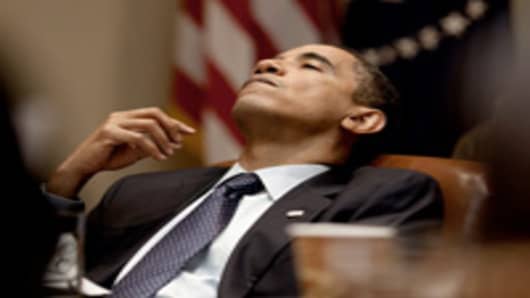The Obama administration's proposal to allow companies to immediately write off 100 percent of new capital investment expenses through 2011 may not be as effective at jump-starting the economy as hoped.
Businesses now deduct capital expenses over years, according to various depreciation schedules embedded in the tax code. The Obama administration would let them take the deductions immediately. The hope is that this will prompt companies to stop "hoarding" cash and start spending on investments.
While it's tempting to applaud almost any reduction in the tax burden on American businesses, we're not sure this plan will work as advertised. In fact, it may be economically destructive.
The first thing to notice is that this is an example of economic central planning. The White House believes businesses are not spending enough on capital investments. But how on earth does the White House know the right level of investment activity? Presumably, businesses are conserving cash because they fear that end-user consumer demand will not justify further expenses.
To put it differently, the housing downturn revealed that the savings of the American people were far smaller than previously understood. A reduction in savings implies a reduction in future spending power. It only makes sense for businesses to hesitate when it comes to investing in new productive capacity in light of the diminished spending capacity of consumers. The perception that the US economy suffers from an 'output gap' ignores this reality.
This means that using the tax code to prompt more spending may just result in over-investment and subsequent production over-capacity.
That, in turn, sets the stage for another recession.
So, from this perspective, perhaps it is fortunate that the immediate tax write-off probably won't prompt as much additional business spending as the Obama administration thinks. That's because the Fed's zero-interest rate policy undermines the value of being able to expense investments immediately.
"Notice that expensing merely accelerates deductions. Thus, the value to the firm depends on interest rates. With interest rates near zero, the impetus to investment is small,"writes economist Greg Mankiw.
"Put another way, this policy can be seen as giving firms a zero-interest loan if they invest in equipment. But with interest rates near zero anyway, the value of the loan is not that great."
(Note: Mankiw applauds the administration's proposal as a "small step in the right direction.")
There's a small irony here. Ordinarily, the way the government attempts to prompt businesses to invest at politically desirable levels is by lowering interest rates. But with the Fed already locked into a zero-interest rate policy and corporate bonds flooding out at rock-bottom yields, there's not much room for monetary policy to exercise influence.
That leaves the government stuck with fiscal policy fixes. But the zero interest rate policy also undermines the fiscal fix.
Maybe the impossibility of an effective fix should be read as a message to policy makers to stop second guessing business spending decisions. We doubt that's a message that Washington, DC can read.



